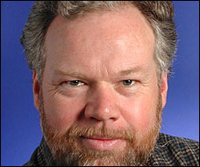Anatomy of America’s Crisis
Thomas Ricks of “Washington Post” dissects Iraq policy in lecture Monday

Thomas Ricks does not mince words. “The war in Iraq is a failure of American power,” says the Washington Post’s Pentagon correspondent and author of the best seller Fiasco: The American Military Adventure in Iraq.
Ricks, who delivers the Stanley P. Stone Distinguished Lecture on Monday, April 2, at the College of General Studies, says that five American institutions failed in a major way during the run-up to the war with Iraq, including the Bush administration, the intelligence community, and the media, lapses that undercut the subsequent occupation. But Ricks says that not enough attention has been paid to the other two institutions involved: the military establishment and the Congress.
“The Bush administration made mistakes, and some of them were whoppers,” says Ricks, who has covered the U.S. military since 1992, first for the Wall Street Journal and since 2000 for the Washington Post. “But we also should look at how the military went into Iraq unprepared for the task at hand, with generals failing to recognize the nature of the conflict in which they were engaged and sending troops to do missions for which they were not trained. Also, our generals used tactics that were counterproductive, like rounding up tens of thousands of military-age Iraqi males, ranging from hard-core terrorists to simple farmers, which helped inflame the insurgency. Most of all, Congress was asleep at the wheel, failing in its basic duty to provide oversight.”
And there aren’t any easy solutions. “I think we are pretty stuck in Iraq,” Ricks says. “We could walk away from Vietnam, which was on the periphery of U.S. interests. I don’t think extricating ourselves from Iraq will be so easy, because it is in the middle of a region vital to the interests of the U.S. economy, and indeed, the global economy. The first thing to do is understand, again, what a departure from American tradition this war is: a war of preemption commenced on false premises; the first-ever American occupation of an Arab country; the first sustained ground war fought overseas by the United States with an all-volunteer force.”
Ricks, who was on reporting teams that won Pulitzer Prizes in 2000 and 2002, was invited to speak initially at the request of the CGS World Affairs Forum, a student group headed by Bruno Hoguet (CGS’07, CAS’09). Hoguet, who served two tours of duty in Iraq as a Marine before coming to Boston University, says that when he read Fiasco, “it explained a lot about how we got into Iraq and the various failures of leadership within the uniformed and civilian Department of Defense. I think it’s information that is vital for people to know in a democracy.”
The Stone lecture series, which brings a guest speaker each year to CGS, was funded by Stanley P. Stone (CGS’64, SMG’66) beginning in 1990. The series has included speakers such as E. O. Wilson, Paul Fussell, and John Lewis Gaddis.
Ricks describes Iraq as a tragedy. “That means there are no good answers. The smartest thing to do is read Shakespeare’s tragedies — and remember that his had five acts, and we probably are only in Act III.”
Thomas Ricks delivers the Stanley P. Stone Distinguished Lecture on Monday, April 2, at noon in the CGS Auditorium, 871 Commonwealth Ave. He is also scheduled to appear on the National Public Radio program On Point on WBUR-90.9FM on Monday at 10 a.m.; the program rebroadcasts that evening at 7 p.m.
Taylor McNeil can be reached at tmcneil@bu.edu.